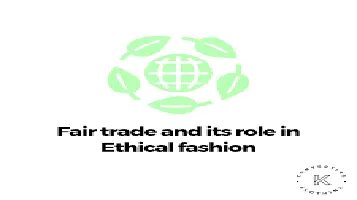Fair Trade Certified Clothing: Ethical Fashion with a Conscience
Fair Trade Certified Clothing ensures that garments are produced under ethical and sustainable practices, benefiting both workers and the environment. This certification guarantees that workers receive fair wages, safe working conditions, and community development funds, which help improve their quality of life. It also emphasizes environmentally friendly practices, such as reduced chemical use and water conservation, promoting a more sustainable fashion industry. By choosing Fair Trade Certified Clothing, consumers support transparency and responsibility in the supply chain, encouraging brands to uphold high ethical standards. This certification not only empowers workers by providing them with economic opportunities but also allows consumers to make informed choices that align with their values, fostering a global movement towards more equitable and sustainable fashion.

In an era where consumers are increasingly conscious of the ethical implications behind their purchases, Fair Trade Certified Clothing has emerged as a beacon of responsible fashion. As the fashion industry grapples with issues ranging from exploitative labor practices to environmental degradation, Fair Trade certification offers a compelling alternative that aligns with values of sustainability, equity, and social justice. This review delves into the multifaceted benefits of Fair Trade Certified Clothing, examining its impact on workers, the environment, and the broader fashion industry.
Empowering Workers Through Fair Trade
At the heart of Fair Trade Certified Clothing is a commitment to improving the lives of garment workers. The certification ensures that employees are paid fair wages, work in safe conditions, and have access to essential rights such as collective bargaining. This stands in stark contrast to the often dire circumstances faced by workers in conventional fast fashion supply chains, where low wages, hazardous working conditions, and lack of job security are rampant.
One of the most compelling aspects of Fair Trade certification is its emphasis on community development. A portion of the Fair Trade premium paid by brands goes directly into a communal fund managed by the workers themselves. This fund is used to invest in projects that benefit the entire community, such as building schools, improving healthcare facilities, or providing scholarships. This not only improves the immediate quality of life for workers and their families but also fosters long-term socio-economic development.
Environmental Stewardship and Sustainability
Fair Trade Certified Clothing is also synonymous with environmental stewardship. The certification includes stringent environmental criteria that promote sustainable farming and manufacturing practices. For example, Fair Trade cotton must be grown using methods that reduce pesticide use, conserve water, and maintain soil health. These practices not only protect the environment but also safeguard the health of farmers and their communities.
Furthermore, Fair Trade certification encourages the use of organic materials and sustainable fibers, reducing the fashion industry’s reliance on non-renewable resources and harmful chemicals. By prioritizing eco-friendly practices, Fair Trade Certified Clothing contributes to a more sustainable and less polluting fashion industry.
Consumer Consciousness and Market Impact
For consumers, purchasing Fair Trade Certified Clothing is a powerful act of solidarity and ethical consumption. It allows individuals to align their purchasing power with their values, supporting brands that prioritize people and the planet over profit. The growing popularity of Fair Trade Certified Clothing reflects a broader shift towards conscious consumerism, where buyers are more informed and selective about the origins and impact of their purchases.
The market impact of Fair Trade certification is significant. As more brands adopt Fair Trade practices, the demand for ethically produced garments increases, encouraging more manufacturers and suppliers to adhere to these standards. This creates a ripple effect that can lead to widespread changes in the industry, pushing even non-certified brands to improve their labor and environmental practices to stay competitive.
Challenges and Considerations
Despite its many benefits, Fair Trade Certified Clothing is not without challenges. One of the primary hurdles is the higher cost associated with ethical production. Fair wages, sustainable materials, and community investments all contribute to the final price of Fair Trade garments, which can be higher than their fast fashion counterparts. This can be a barrier for price-sensitive consumers, although many argue that the long-term social and environmental benefits justify the additional cost.
Another challenge is the scalability of Fair Trade practices. While the certification has made significant inroads, it still represents a small fraction of the global fashion industry. Achieving widespread adoption requires concerted efforts from policymakers, brands, and consumers alike. Education and awareness campaigns are crucial in this regard, helping to inform the public about the importance of Fair Trade and encouraging more ethical consumption patterns.
Conclusion: A Step Towards a Better Future
In conclusion, Fair Trade Certified Clothing represents a transformative approach to fashion, one that prioritizes human dignity, environmental sustainability, and ethical integrity. By empowering workers, promoting sustainable practices, and fostering conscious consumerism, Fair Trade certification offers a viable alternative to the exploitative and environmentally damaging practices that have long plagued the fashion industry.
While challenges remain, the growing demand for Fair Trade Certified Clothing is a testament to the changing values of consumers and the potential for positive change within the industry. By supporting Fair Trade brands, consumers can play a crucial role in driving this change, contributing to a more just and sustainable future for all. In a world where every purchase has an impact, Fair Trade Certified Clothing stands out as a choice that truly makes a difference.






